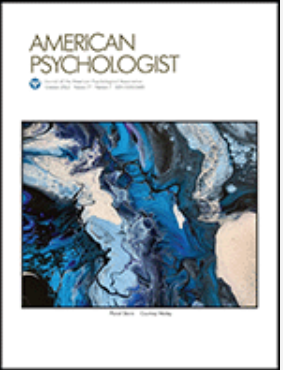Dehumanization risks associated with artificial intelligence use.
IF 12.3
1区 心理学
Q1 PSYCHOLOGY, MULTIDISCIPLINARY
引用次数: 0
Abstract
People employ artificial intelligence (AI) tools to perform tasks that otherwise would require human intelligence. This review seeks to advance the understanding of adverse psychosocial outcomes of AI while acknowledging its benefits. Specifically, does AI employment pose unfavorable consequences such as the denial of its users' humanity in certain situations? Based on the theoretical distinction between meta-, self-, and other-dehumanization, we synthesize existing research on the dehumanization risks associated with AI use. We first separate AI use-induced dehumanization into three levels: human-AI interaction, intrapersonal dynamics, and interpersonal relationships. We also identify potential consequences of dehumanization by relating it to users' attitudes toward AI, their self-regard, and their social relationships. Moreover, we illustrate AI-, user-, and community-related interventions toward mitigating the dehumanization risks of AI use. Finally, we outline directions for future research in this area. (PsycInfo Database Record (c) 2025 APA, all rights reserved).与人工智能使用相关的非人性化风险。
人们使用人工智能(AI)工具来执行原本需要人工智能的任务。本综述旨在促进对人工智能的不良心理社会后果的理解,同时承认其益处。具体来说,人工智能的使用是否会带来不利的后果,比如在某些情况下否定其用户的人性?基于元非人性化、自我非人性化和他人非人性化的理论区分,我们综合了与人工智能使用相关的非人性化风险的现有研究。我们首先将人工智能使用引起的非人性化分为三个层面:人类-人工智能互动、人际动态和人际关系。我们还通过将非人性化与用户对人工智能的态度、他们的自尊和他们的社会关系联系起来,确定了非人性化的潜在后果。此外,我们说明了人工智能、用户和社区相关的干预措施,以减轻人工智能使用的非人性化风险。最后,对未来的研究方向进行了展望。(PsycInfo Database Record (c) 2025 APA,版权所有)。
本文章由计算机程序翻译,如有差异,请以英文原文为准。
求助全文
约1分钟内获得全文
求助全文
来源期刊

American Psychologist
PSYCHOLOGY, MULTIDISCIPLINARY-
CiteScore
18.50
自引率
1.20%
发文量
145
期刊介绍:
Established in 1946, American Psychologist® is the flagship peer-reviewed scholarly journal of the American Psychological Association. It publishes high-impact papers of broad interest, including empirical reports, meta-analyses, and scholarly reviews, covering psychological science, practice, education, and policy. Articles often address issues of national and international significance within the field of psychology and its relationship to society. Published in an accessible style, contributions in American Psychologist are designed to be understood by both psychologists and the general public.
 求助内容:
求助内容: 应助结果提醒方式:
应助结果提醒方式:


